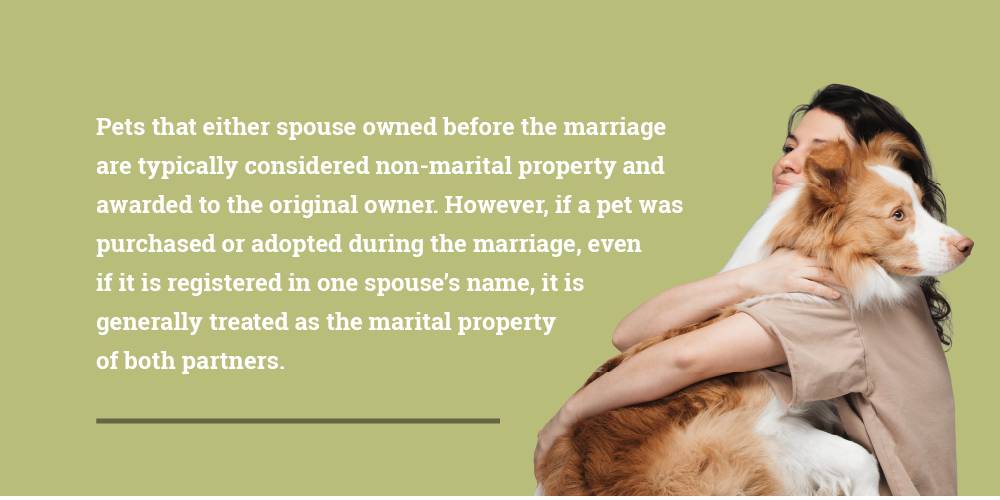630-462-9500
After Hour New Client Telephone Number 630-690-6077
1776 S. Naperville Road, Building B, Suite 202,
Wheaton, IL 60189
Are Family Pets Considered Property in Divorce?
 When spouses divorce in Illinois, deciding who will keep the family dog, cat, or other beloved pet can be a contentious issue. Many people consider their pets to be important and beloved members of their family, but under Illinois law, animals are treated differently than children in divorce proceedings. Our Wheaton, IL divorce attorneys are here to help you understand how the law applies to pets in a divorce. Beyond that, we will help you prepare for the overall process, including any other issues that need to be addressed.
When spouses divorce in Illinois, deciding who will keep the family dog, cat, or other beloved pet can be a contentious issue. Many people consider their pets to be important and beloved members of their family, but under Illinois law, animals are treated differently than children in divorce proceedings. Our Wheaton, IL divorce attorneys are here to help you understand how the law applies to pets in a divorce. Beyond that, we will help you prepare for the overall process, including any other issues that need to be addressed.
How Are Pets Treated in Illinois Divorces?
Under Illinois law, pets are legally considered personal property. This means that, like cars, furniture, or bank accounts, pets are subject to property division during a divorce. However, Illinois has taken steps to recognize the special place pets hold in families. As of July 2025, the Illinois Marriage and Dissolution of Marriage Act (750 ILCS 5/503(n)) continues to allow courts to consider the well-being of companion animals when determining ownership in divorce cases.
This amendment represents a shift away from viewing pets as mere property. Judges can now award sole or joint ownership and may consider which spouse can best care for the animal, who has been the primary caregiver, and what arrangement would serve the animal’s well-being. However, the law stops short of recognizing custody or visitation rights for pets in the same way it does for children.
Mediation Can Help Resolve Fights Over a Pet During Divorce
There is no question that judges prefer to see couples create an agreement on their own about what should happen to their pets in a divorce. However, because of the emotional attachment people have to their pets, disputes over ownership can become highly contentious. Unfortunately, when a couple already has a difficult relationship followed by a difficult divorce, fighting over a pet becomes an easy way for spouses to punish each other in retaliation for things that happened in their relationship.
When there is a simple disagreement of fact and everybody is working in good faith, spouses can benefit from using mediation to resolve disagreements about pets and other divorce issues. Mediation allows couples to work with a neutral third party to reach a voluntary agreement that considers both parties’ preferences and the pet’s needs. This approach often results in more creative and flexible arrangements, such as shared care plans or financial contributions for the pet’s expenses, and can reduce the emotional strain of litigating these sensitive matters.
If a couple cannot agree on what to do with their pet, then their case may move forward to litigation and a judge may end up making the decision for them.
Are Pets Considered Marital or Personal Property?
Illinois distinguishes between marital and non-marital property. Pets that either spouse owned before the marriage are typically considered non-marital property and awarded to the original owner. However, if a pet was purchased or adopted during the marriage, even if it is registered in one spouse’s name, it is generally treated as the marital property of both partners.
If marital funds were used for the pet’s care, such as for covering the costs of pet food, veterinary bills, or grooming, that financial investment may also influence how ownership is decided.

Factors Illinois Courts Consider When Deciding Pet Ownership
When deciding who should keep a pet, Illinois courts may examine a variety of factors, including:
-
Which spouse has been the primary caregiver, including feeding, walking, grooming, and arranging veterinary care for the pet.
-
Who has a stronger emotional bond with the pet, as demonstrated by the time spent together and the pet’s comfort around that spouse.
-
Whether the pet was owned before or during the marriage, since pets bought or adopted before marriage are often considered non-marital property.
-
Which spouse has the financial resources, time, and living situation best suited for the pet’s care (such as access to a yard or ability to pay for ongoing veterinary expenses).
-
The presence of children in the household and whether keeping the pet with the children would provide emotional stability during and after the divorce.
These considerations give judges significant discretion in determining pet ownership. However, it is important to note that courts often prefer to assign ownership to one spouse to avoid ongoing disputes.
If My Dog Likes Me Better, Can I Keep Him in a Divorce?
The bond between the pet and each spouse can definitely play a role in determining who should keep the animal. Judges may consider evidence such as which spouse the pet seeks out for comfort, who spends more time engaging with the pet, and how the pet reacts to each party. Testimony about the pet’s daily routines and emotional connection to each spouse can influence the court’s decision, especially when combined with evidence of care and responsibility.
This is also true of the pet’s relationship with the children. Because a court’s main goal in a divorce is seeking and enforcing the best interests of any children involved, if the children are highly attached to the family pet, the pet will likely go to whichever home the children spend the most time in. A skilled attorney can help you present evidence of your or your children’s bond with the pet and the care you have provided, which may strengthen your position in court.
Can We Agree to Share Custody of a Pet After We Get Divorced?
Although Illinois law does not require courts to set up detailed custody schedules for pets, spouses can agree to share responsibility outside of court. For example, they may decide to split time with the pet or arrange visits. These agreements, however, are not enforceable in the same way as child custody arrangements, and disputes over pet-sharing can become difficult to resolve.
For many couples, negotiating a private agreement on pet ownership and visitation is the most effective way to ensure the animal continues to receive love and care from both parties.
Contact a DuPage County, IL Divorce Attorney for Divorces Involving Pets
If you are going through a divorce and are worried about what will happen to your family pet, speak with a lawyer who understands how Illinois law treats companion animals. At The Stogsdill Law Firm, P.C., our Wheaton, IL divorce lawyer is available for consultations to discuss your concerns and help you protect what matters most. Call 630-462-9500 today to schedule a consultation.




















